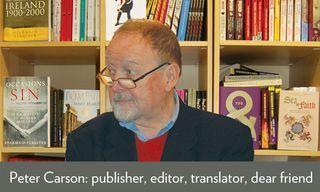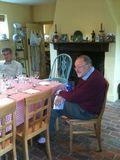Peter Carson -- farewell

Peter Carson, my editor, publisher and one of my very best friends, died on Wednesday. It was, as the phrase goes, "after a long illness". But that gives rather the wrong impression, I think, as if somehow the last months of his life were taken up with nothing more than failing health. In fact, he had just finished his latest Russian translation (of which more below), we had enjoyed a drink just before Xmas (over which he was full of good advice about how I should put my literary estate in order; it is needless to say a mess) and he has been acutely editing my next book, Confronting the Classics, over the last several months.
And in fact it was only a few months ago that we (husband and I) spent a tremendous and over indulgent weekend with Peter and his wife Eleo Gordon (plus Andrew Franklin and Caroline Elton) at their house in Hampshire. So never mind the paraphernalia of oxygen etc, please don't imagine that "after a long illness" necessarily means half dead for months. This was one of the best weekends I've ever had -- and Peter enjoyed it too. Or I shall be posthumously disappointed in him if he didnt! (He seems to be having fun in the photo on the right, with Andrew looking -- dare I say it -- slightly knackered...? )
Peter enjoyed it too. Or I shall be posthumously disappointed in him if he didnt! (He seems to be having fun in the photo on the right, with Andrew looking -- dare I say it -- slightly knackered...? )
Anyway, I shall be getting my chance later to reflect more formally on what Peter achieved, and how in that self-confidently self-effacing way he was probably more influential in the literary landscape of this country in the second half of the twentieth century than anyone else (he brought us Zadie Smith, Donna Tartt, Robin Lane Fox... and that's just a start). Here I want to reflect, outreageously personally, on why for me he was such a great editor, indeed how he taught me what a great publisher and editor was.
I think I first met Peter in something like 1998, when he just had left Penguin after decades there and had started working with Andrew Franklin at Profile. He took me to lunch at what must have been the Bleeding Heart in Hatton Garden to talk about Penguin Classics (which he was still loking after) and "other projects". It was over that lunch. I'm sure, that I splurged about The Parthenon, and how there was a wonderful story to tell of this monument through time -- not just stopping in the fifth century BC. I remember going on about how if one wanted to reach a general audience for History in the UK, then one of the ways of doing that was through travel and tourism; people always wanted to know about the place they were going to visit. By the end of lunch, Peter had invented the Wonders of the World series, had a trailed a list of possible authors... and I went home to write a proposal for what was to be The Parthenon.
Every book I have written since then has been brought into the world largely thanks to him. He had a brilliant knack of seeing what someone would be really good at writing even if they hadn't quite realised it themselves (that's the ultimate editorial talent). And, in fact, Pompeii was his idea too. I'd worked on the town for many a year and taught it, and given seminar papers and lectures. It was Peter who said something like "I think you could write a rather good book on it". And thanks to him I think I did.
That "I think you could write a rather good book on it" was typical. There was plenty of wit and sharpness, but no guff or hype in Carson-country. If he told you that your first chapter was "really rather good" (accent on "good"), you knew you were away...he didn't think that you needed it larded on, still less that you needed lying to. And his hints were all of the gentlest kind. "Remember we're going to try to sell this to America" he might say, after he'd read a chapter in which every comparative example or work of literature you had referred to had been resolutely British.
But that didn't mean that he didn't put himself out to help with anything or anyone when you needed it. Peter seemed to know everyone you wanted to meet (he'd either been at school with them, or uni, or more likely he'd published them at some point in his life). When I needed to see Bulwer Lytton's prize Pompeian skull (still kept at Knebworth) during the house's closed season, he was quickly writing a letter to the owner to get me in; and a great time we had too. When I was doing a bit of work on the mosaicist, Boris Anrep, he soon had me talking to some friends of his who'd know the man. Most of all though, he wanted you -- after that first little push -- to follow your own nose. I remember vividly when a lot of people were faffing about how much time doing a television programme would take from my other obligations, he said very quietly to me "you must do what you want to do". Which is what I did.
Over the last few weeks of his lfe he was finishing a translation for Norton in the US (through Bob Weil, another publishing legend) of Tolstoy's Confession and The Death of Ivan Ilyich -- imagine doing that as your last mortal job. I've seen a few of the emails he sent about it over the final twelve months of his life, reporting on progress, tweaking, arranging the delivery of the absolutely finished corrected manuscript the very day before he died. And since this is a personal response, let me be allowed to confess to being overwhelmed by the way in those messages he was passing on to Norton in the US (who are also set to publish me) all kinds of little titbits about how I was getting on, putting a word in for my latest manuscript, reporting in on the television shows. The simple thought of being in someone's head, being "looked out for" by them, while they are reaching the end of their own days and trying to finish their own work.. just how touching is that.
And what an editor.
Mary Beard's Blog
- Mary Beard's profile
- 4106 followers



